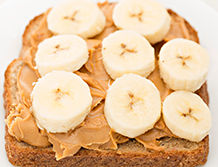
Credit should probably go to moms across America for establishing the notion that breakfast is the most important meal of the day. That’s a sentiment 93 percent of Americans agree with, even though 56 percent of them don’t eat breakfast seven days a week, according to the 2009 International Food Information Council Foundation’s Food & Health Survey.
JOIN THE CONVERSATION!
Do you urge your clients to eat breakfast? Or do you think they should skip it and save the calories for later in the day? Give us your take on this much-debated topic in the comment section below.
Of course, one of breakfast’s biggest claims to fame is the effect it can have on weight, perhaps even helping people slim down. For proof of this, look no further than the National Weight Control Registry (NWCR), a database of more than 10,000 individuals 18 years and older who have lost at least 30 pounds and kept it off for a year. A whopping 78 percent of these individuals report eating breakfast daily, which researchers believe is a crucial component in weight maintenance.
Yet whether breakfast can help prevent obesity is a topic that’s up for debate, especially given a new study that found little support for this claim. This doesn’t mean, though, Americans have to give up their beloved breakfasts, but it does suggest that common assumptions about breakfast may need to be revamped.
Breakfast No Belly Buster?
In one of the most comprehensive reviews of eating versus skipping breakfast, researchers set out to determine if scientific evidence existed to support eating breakfast to prevent obesity. The commonly accepted belief, after all, is that eating breakfast may not only prevent obesity, but may also help people slim down.
Surprisingly, though, evidence to support these claims is severely lacking, according to this study published in the American Journal of Clinical Nutrition. “Our summary of the literature shows that the jury is still out on whether there’s a unique effect of breakfast eating versus breakfast skipping on weight,” says Andrew W. Brown, Ph.D., study co-author from the Nutrition Obesity Research Center at the University of Alabama at Birmingham, adding that given the certainty with which recommendations to eat breakfast for weight control are made, he expected the evidence to be stronger. “There are few randomized studies looking at eating versus skipping breakfast and obesity, and the ones that exist didn’t show an overall protective effect of breakfast on obesity.”
There are, however, numerous observational studies that have repeatedly shown an association between skipping breakfast and obesity. For instance, some evidence indicates that people eat fewer calories at lunch when they eat breakfast than if they’d skipped it.
On the flip side, however, other studies have found that when calories from breakfast and lunch are added together, people skipping breakfast actually eat fewer calories. And although most people in the NWCR do eat breakfast, some of the published data on registry participants shows no differences in weight loss or maintenance between breakfast eaters and breakfast skippers.
So what’s the bottom line from this study? “We know that a number of important metabolic hormones cycle throughout the day, so it’s certainly feasible to expect that changing what and when we eat could influence weight,” Brown says. “However, we’re not confident enough yet to say what those influences are and, unfortunately, the answer of whether breakfast is beneficial for weight depends on the individual, what they eat and their activity level.”
Why Your Clients Might Want to Wake Up to Breakfast
Although breakfast’s impact on weight is debatable, numerous other reasons might prompt all of us to make breakfast part of our daily routines. When most of us wake up, after all, we probably haven’t eaten in at least eight to 10 hours, depending, of course, on when we ate our last meal the night before and how long we’ve slept. Yet by breaking that fast, several positive things happen in the body.
For starters, when you go long periods of time without eating, your metabolism slows, and your body compromises muscle mass to create the fuel it needs to function, says Meridan Zerner, M.S., R.D., C.S.S.D., L.D., sports dietitian and personal trainer with the Cooper Clinic in Dallas. By eating, though, you’re giving your metabolism a little boost and nourishing your body, which prevents muscle mass loss.

Of course, if you’re a morning exerciser, having something to eat, even a snack like peanut butter and banana slices on toasted whole-wheat bread, gives your muscles the fuel they need to sustain physical activity. “If you don’t have fuel in your system, especially after an overnight fast, you may run on empty—literally and figuratively—when you exercise that morning,” says Elisa Zied, M.S., R.D., C.D.N., New York-based dietitian, founder and president of Zied Health Communications, and author of Younger Next Week (Harlequin Nonfiction, 2013). By eating a small amount of carbohydrates with some fat, however, you’re providing energy and nutrients for your body to optimize exercise.
But what about that theory that says working out on an empty stomach in the morning can help a person burn more fat? It doesn’t hold merit. “You can burn a greater percentage of calories from fat doing this, but you’ll have less energy, which means you’ll probably work out more slowly or less aggressively,” Zerner says. As a result, you’ll burn fewer calories, and that’s what matters most when it comes to slimming down.
Studies have also found that skipping breakfast can contribute to low blood sugar levels, making you feel irritable and sluggish, and could even increase the risk of type 2 diabetes in some men, Zied says. In fact, controlling blood sugar is one of the major reasons Zerner recommends breakfast, especially for individuals who have pre-diabetes, a condition that affects 35 percent of adults over the age of 20 (50 percent in people 65 and older), according to the Centers for Disease Control and Prevention.
By making breakfast part of the day, you also stand a better chance of getting your fill of required daily nutrients. “People who eat breakfast are more likely to meet daily recommendations for fruit and veggie consumption,” says Zerner, adding that breakfast eaters typically also eat higher amounts of calcium and fiber each day.
And don’t forget the brain benefits. “You’ll have better mental performance, both in memory and attention, and greater mental energy to face the day,” Zerner says.
Building a Better Breakfast
One of the biggest mistakes people make with breakfast, though, is eating foods loaded with excess calories and too few nutrients. If your clients are choosing foods high in calories and saturated fat and low in nutrients—think pastries, croissants or a bacon, egg and cheese sandwich on white bread—they could be setting themselves up for trouble, essentially missing out on many of the above-mentioned benefits.
Instead, urge your clients to create a healthy breakfast by squeezing in three food groups, Zied says. Those three include whole grains; protein-rich foods like low- or non-fat milk and yogurt, eggs, nuts, seeds and nut butters; and fresh or dried (but unsweetened) fruit. Here are two meals that fit these requirements: a bowl of whole-grain cereal with low-fat milk and berries or a breakfast burrito made with a whole-wheat flour tortilla, a mixture of egg and egg whites, and shredded cheddar cheese with a side of mixed berries.
Or use Zerner’s formula: A carbohydrate (preferably high-fiber) and protein plus color. For instance, pair a whole-wheat muffin with a slice of cheese and bowl of berries.
What if your client is not used to eating in the morning, but wants to adopt the breakfast habit? Fortunately, it is possible to train ourselves to be hungry when we wake up. First, urge your clients to look at when they eat the last meal of the day. If it’s right before they go to bed, recommend that they try eating earlier if possible to give food time to digest, Zerner says. If that’s not possible, urge them to at least eat something by mid-morning the next day.
Then your clients can gradually ease into this new habit, starting with just a little something to eat like a banana, low-fat yogurt or handful of whole-grain cereal. Over time, they can add a second food group and finally a third to their morning medley, Zied says. As the body becomes more accustomed to being fed in the morning, they’ll begin waking up hungrier and will want to satisfy that grumbling tummy sooner rather than later.
In the end, give Mom a pat on the back. Even though breakfast may not be an effective weight loss tool, it offers numerous other benefits, making it too important a meal to skip.

 by
by 



